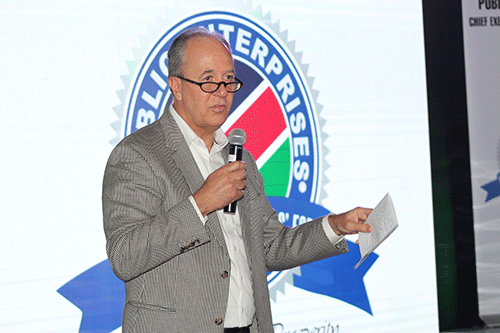With the liquidation of Air Namibia still reverberating, public enterprises minister Leon Jooste yesterday warned state-owned enterprises (SOEs) that the honeymoon is over when it
comes to government bailouts.
Speaking at the annual Public Enterprises’ CEO Forum that took place just outside Windhoek, Jooste warned SOEs, both commercial and non-commercial, that government does not have money and they should thus drastically revise their high-cost structures. In a wide-ranging address, Jooste told the captains of SOEs that “the attitude and mindset of ‘don’t worry, they’ll never let us go, they’ll give us money’ must be over”. He added that the mindset that money will solve all problems “is wrong”.
Air Namibia’s liabilities as at August 2020 totalled N$3 billion, compared to assets of only N$981 million. Its liquidation left 634 people on the street when government decided to cut the umbilical cord after years of bailouts blamed on a flawed business model and some political interference in managerial appointments.
Similarly, Namibian Broadcasting Corporation (NBC) workers just ended a month-long strike without government coming to their rescue, as it has done in the past.
The NBC board, management and striking workers all decried the 62% reduction in subsidy to the broadcaster in this year’s budget allocation.
As a first step to becoming self-sustainable and self-sufficient, Jooste advised both commercial and non-commercial SOEs to adhere to compliance measures as stipulated
by law.
He noted that out of 24 commercial SOEs, only nine have governance and performance agreements; only 10 have up-to-date annual reports; and only 11 have approved Integrated Strategic Business Plans (ISBPs), which equates to a compliance level of 42%.
Out of the 42 non-commercial SOEs, only 17 have performance and governance agreements in place; only 10 have up-to-date annual reports; and a mere six have approved ISBPs.
Jooste furthermore broke down the value of SOEs, noting that commercial government entities had total assets of N$82 billion, but liabilities of N$43 billion, which equals to a net asset value of N$39 billion. For non-commercial entities, the asset value is N$20 billion and liabilities stand at N$8 billion, which leaves a net asset value of N$12 billion. “We need to have some uncomfortable discussions, and we need to be more comfortable with uncomfortable discussions,” stated Jooste.
In this regard, he reiterated that government does not have money, and that any money needed for bailouts will have to be taken from other sources which also need funding.
Speaking before Jooste took the stage, Windhoek mayor Job Amupanda urged attendees to ask themselves what they can do to bring about development in
the country, and to enable public enterprises to run efficiently.
“If public enterprises do not set the example, then we are doomed,” he cautioned.
Said Amupanda: “Things are changing, and people are hopeful. It looks bad, but things are changing, and will continue to change. But we need resolute leadership that is championing a developmental state so that we can save our country”.
Commenting on Jooste’s remarks, local economist Mally Likukela welcomed the rhetoric as a step in the right direction, but said it was a little too late.
“The millions lost through bailouts remain a deadweight loss to Namibia. The announcement is also suspicious, given the timing that coincides with the International Monetary Fund (IMF) loan. It would appear as if it is made to appease the IMF. The sustainability issues of SOEs go beyond bailouts, or lack
of a bailout. It is a structural issue that should have been sorted out a long time ago,” Likukela reasoned.


